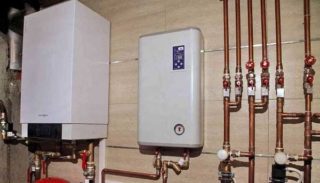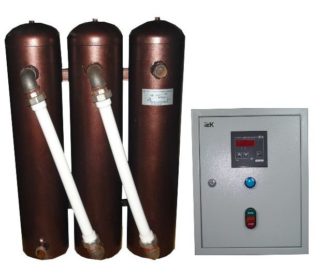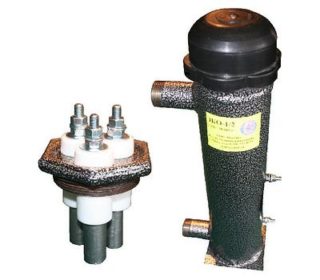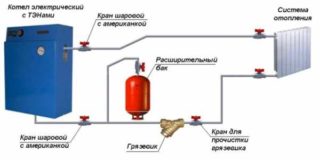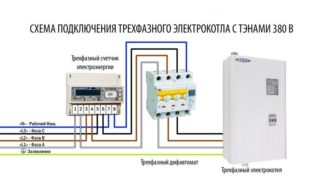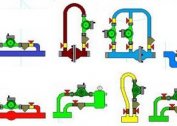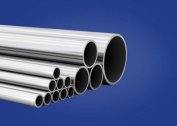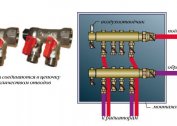An electric boiler is an advantageous alternative to solid fuel or gas appliances. It has an increased efficiency, does not make noise during operation, it does not require a separate room and obtaining special permission for installation. Electric boilers for heating a private house at 380 V belong to the category of powerful three-phase appliances and are divided into several types. Before buying and installing such a boiler, it is useful to study its pros and cons, the rules of operation and installation, as well as the available connection options.
Types of electric boilers
Electric boilers for heating a private house at 380 volts can be electric, electrode or induction, depending on the type of energy transfer to the heat carrier. Manufacturers offer floor and wall options suitable for large and standard houses and cottages. They have a different degree of protection and increased efficiency.
Electrical units can be three-phase or single-phase, the first option is usually chosen for houses with an area of more than 100 meters. The power of three-phase boilers starts from 10 kW, the list of their advantages includes stable voltage and circuit protection. However, they are limited in terms of installation, since the installation of a lowering station is required. To find out which model to choose, it is better to contact a specialist.
Heating elements
Such units are considered the most popular and work on a single principle. The tubular element heats the water circulating inside the system, which ensures uniform and quick heating. Inside such a boiler there can be from 1 to 6 heating elements, their number directly depends on the power of the device. The three-phase electric heating boiler is equipped with a special automation system, due to which the temperature of the heat carrier is monitored and regulated.
The device has a simple and reliable design, is easy to install and does not cause problems during use. Boilers for heating elements are quite cheap, almost any liquid is suitable as a heat carrier for them. In addition to the main advantages, modern TEN models differ in a concise and modern design, which allows you to fit them into every interior. It is necessary to use high-quality coolants that prevent the appearance of scale.
To reduce scale formation, anode rods are installed to collect excess salts. They can be changed as they wear out, as do the heating elements themselves.
Induction
Electromagnetic induction boilers are often used for residential applications. Inside the cylindrical body of such a device is a core of metal with a coil wound on it. During the supply of voltage to the coil, a vortex flow forms, due to which a pipe with a circulating coolant heats the water. To avoid overheating, water should circulate constantly.
The efficiency of such devices reaches a maximum value of 98%, which makes induction boilers the most efficient. In addition, the 3 kW electric boiler for 3 phases is not prone to scale formation and is considered the safest, since there are no heating elements in it. Induction units can be mounted in the shortest possible time due to their light weight and compact size.
The induction heating boiler does not need a circulation pump if it is used in a home heating system. This part is required for large systems in multi-storey buildings.
Electrode
Electrode-type boilers operate on specially prepared water, in which salts are dissolved to increase the density to the desired level. A three-phase electric boiler consists of a pipe into which a pair of electrodes is inserted. Due to the potential difference and the change of polarities, the ions inside begin to randomly move, as a result, the heat carrier heats up faster.
Thanks to accelerated heating, powerful convection flows warm a large volume without the need for a circulation pump. Among the advantages of 380 kW electrode devices, compact sizes, an accelerated output at rated power, a simple design and a low accident rate are noted, even if water starts to flow from the heating system.
For electrode assemblies, grounding is equipped. A boiler and all elements of the heating system in the house are connected to the ground loop.
Advantages and disadvantages of three-phase boilers
An electric boiler for heating a house at 380 V has more pros than cons. Units are reliable, do not cause difficulties during installation, are presented in a wide price range and functionality. They are cheaper than gas and at the same time equipped with a simple and convenient automation system, including a list of modes, a GSM controller, the ability to maintain the desired temperature. Also in the list of advantages include:
- compact size and aesthetic design;
- lack of problems during use;
- silent work;
- increased efficiency.
The main drawback is the high cost of electricity and associated costs. Electric type boilers are completely dependent on power supply. Only high-quality coolants with a specially selected composition are suitable for them.
Rules for installation and operation of electric boilers for 380 V
It is necessary to connect any 380 V electric boiler in compliance with all requirements regarding safe installation. It is important to correctly calculate the cross section for the power cable, on which the safety of the entire system depends. Since the 380 kilowatt devices are the most powerful, you need to select the most durable cable. The cross section is calculated according to the formula, taking into account which 1 mm2 of cable has no more than 8 A of current.
During the operation of the boiler, they monitor the operability of the electrical wiring and prevent leakage of the heat carrier. You also need to pay attention to the performance of the grounding conductor. In the presence of any damage, disconnect the unit as soon as possible and completely restore grounding. Modern devices with a power of 380 W have proven themselves in the process of long-term operation. To avoid problems, you must follow the rules:
- Do not touch the grounding elements;
- entrust repairs only to specialists with the appropriate qualifications;
- check the power supply before turning it on;
- periodically flush the boiler;
- control the temperature;
- prevent mechanical damage to the boiler.
To monitor the level of heating and control the system, you can optionally put a special thermal switch. It will block the operation of the boiler in emergency situations and will help to avoid possible problems.
Connection to the heating system
To connect a three-phase boiler, you need to adhere to a special scheme. This process is best entrusted to a specialist who must understand the heating devices and know the principles of operation of sensors, pumps and other elements. The scheme for connecting electric boilers to the heating system consists of several standard steps. To avoid possible problems, you must follow the basic rules:
- To fix the elements of the unit, you need to use pipes made of plastic or jumpers made of dielectric material.
- The circulation pump is placed on the pipe for reverse feed.
- A safety group is placed on the pipe for supplying the heated heat carrier.
- When using a small circuit, shutoff valves must be installed after it.
An open expansion tank must be installed at the top of the system without the need for locking devices. Closed tanks are placed close to the device to the stop valves.
380 V Electric Boiler Manufacturers
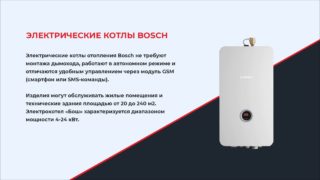 A large selection of electric single-circuit and double-circuit units from Russian and foreign brands is presented on the market. The most complete range of heating equipment is represented by Bosch, TermIT, Protherm, Ferroli, Danko and ATON. German manufacturers pay more attention to build quality, Italian manufacturers pay more attention to design and control panels, and Polish companies produce the most inexpensive boilers of floor and wall type. ATON boilers have double protection, insulation and built-in pumps, are environmentally friendly and have a high level of automation.
A large selection of electric single-circuit and double-circuit units from Russian and foreign brands is presented on the market. The most complete range of heating equipment is represented by Bosch, TermIT, Protherm, Ferroli, Danko and ATON. German manufacturers pay more attention to build quality, Italian manufacturers pay more attention to design and control panels, and Polish companies produce the most inexpensive boilers of floor and wall type. ATON boilers have double protection, insulation and built-in pumps, are environmentally friendly and have a high level of automation.
The most versatile are Bosch boilers. The models of the popular Tronic series are equipped with safety valves, have a capacity of 7 liters and a maximum heating area, are able to quickly heat water and are presented in a large list of options. Ferroli appliances are usually purchased for high-rise buildings. They are equipped with an integrated circulating water supply system and economically consume energy due to the optimal pump power. In low-cost models, the efficiency is less than 100%, the pressure of the thermal carrier is 0.4-0.6 bar.
